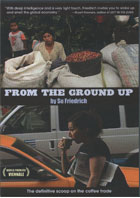
From the Ground Up 2007
Distributed by Microcinema International/Microcinema DVD, 1636 Bush St., Suite #2, SF, CA 94109; 415-447-9750
Produced by Kurt Hoffman and Meg Reichardt
Directed by Su Friedrich
DVD, color, 54 min.
Sr. High - Adult
Agriculture, Business
Date Entered: 07/31/2008
Reviewed by Michael J. Coffta, Business Librarian, Bloomsburg University of PennsylvaniaThe cleverly titled From the Ground Up attempts to bring to the audience the entire process of coffee production, including its being picked, processed, warehoused, distributed, tasted, and even sold by a street vendor in New York City. This aspect of the film is comprehensive and shows a personal dimension to each part of coffee production and commerce. However, it is not made evident to the viewer from the onset, as the film lacks a clear introduction or statement of purpose.
The strategy of filmmaking for From the Ground Up is a unique one: the camera is a third party acting strictly in the role of observer. There is no narration, no commentary. There are, however, a limited number of ad hoc monologues in this documentary, made by the films subjects. For the most part, the audience witnesses the uninhibited workings and transactions of the coffee trade. Many portions of the film, presumably added for local color—such as multiple displays of children lighting firecrackers, are unneeded and altogether uninformative. Though trying to maintain objectivity as its hallmark, another weakness of this documentary is its overall lack of data presentation. Instead of still displays of text or narration that would give the audience an idea of how widespread the plight of the coffee harvesters may be, the song Java Jive is played ad nauseum throughout.
The concept of this film was excellent, but its execution was inadequate. It is successful insofar as it elucidates the entire process of coffee production, including workers’ living conditions in Guatemala, and the machinery used, but it is the unwavering commitment to its “role of the observer” that brings about its shortcomings.